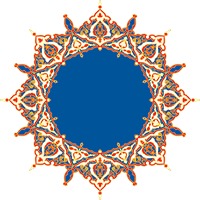
Sura al-Saffat
 37
37
Introduction of Surah
al-Saffat is the 37th sura of the Qur’an, which means ‘Those Ranged in Ranks’ or ‘The Rangers’, deriving its name from the 1st verse. The sura belongs to the Meccan period and comprises 182 verses, 862 words, 3,826 letters, and 5 segments. It is the 56th sura in chronological order, revealed after Sura al-An‘am. The chapter begins with an oath of the angels standing in ranks before God Almighty. The sura stresses the Oneness of God and His ability to raise bodies from the dead at the end of time. The sura mentions the decoration of the lowest heaven with the stars and its protection from rebellious forces. It condemns the deniers of Resurrection as well as those who mislead the people and those that have been misled themselves. For them, the torments of Hell await the evil while the blessed will enjoy the delights of Paradise. The sura further mentions the conversations of the people of Paradise and the treacherous tree of al-Zaqqum. This tree is described as springing from the depths of hell, spurning spikes of fruit like the heads of Satan which will be food for the dwellers of Hell. Following this, the chapter journeys through several prophetic stories that depict the noble and distinguished character of Allah Almighty’s prophets. The chapter reflects on the occasions that Allah Almighty divinely intervened to assist his prophets during times of distress. The sura narrates that Prophet Nuh (Noah [peace be upon him]) called upon God Almighty, and as a result assisted Prophet Nuh (Noah [peace be upon him]) while the others drowned. Similarly, when Prophet Ibrahim (Abraham [peace be upon him]) was flung into the flames and was asked to sacrifice his son, Prophet Isma‘il (peace be upon him), they too were rescued or reprieved by God Almighty.
The sura further details the account of Prophet Ibrahim’s sacrifice of his beloved son Prophet Isma‘il (Ishmael [peace be upon him]) at a young age. As a result, the substitution of a ram for Prophet Isma‘il (Ishmael [peace be upon him]) became the basis for the ritual of sacrificing an animal as the final rite of the Hajj. Further, the sura describes Prophet Ibrahim (Abraham [peace be upon him]) as a great manifestation of obedience, loyalty and devotion. His absolute trust in God Almighty is exemplified when he fulfils the command of God revealed to him in a dream. This unprecedented act of servanthood led Prophet Ibrahim (Abraham [peace be upon him]) towards God Almighty’s special blessings and rewards, making his Sunna ever-lasting for the later generations to come. Moreover, Prophet Ibrahim (Abraham [peace be upon him]) received glad tidings of another son, Prophet Ishaq (Isaac [peace be upon him]), who became the father of the Israelites, and from whose lineage hundreds of prophets descended. In contrast, Prophet Isma‘il (Ishmael [peace be upon him]), whose sacrifice was rewarded by an everlasting ritual, became the father of the Ismailites, who was ultimately blessed with the raising of the Final Prophet Muhammad (blessings and peace be upon him). The sura then continues to refer to the blessings received by Prophets Musa (Moses) and Harun (Aaron [peace be upon both of them]) and recounts the stories of Prophets Ilyas (Elijah), Lut (Lot) and Yunus (Jonah [peace be upon them]). The sura concludes by a warning to the Arab pagans, rejecting their false claims and reassuring the Holy Prophet Muhammad (blessings and peace be upon him) that the forces of the truth will ultimately prevail. The sura ends with the Glorification of God, saying: ‘Peace be upon the messengers; and praise be to God, Lord of all worlds.’
 Read More
Read More
 Show Less
Show Less

